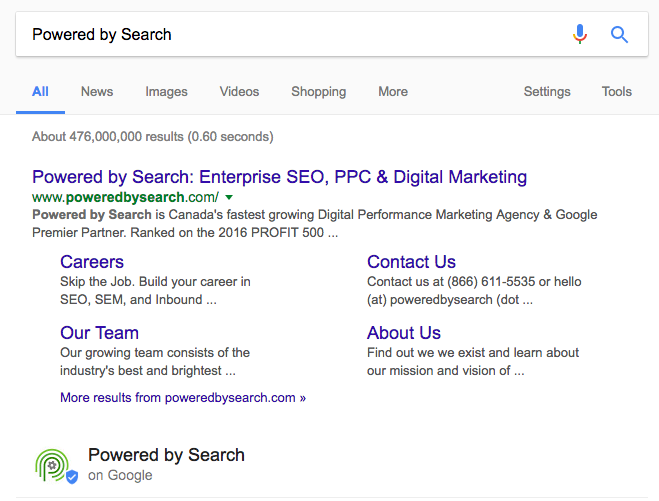Boost your ranking with structured data SEO presentation at PodCamp 2017-02-26

The slides presented at the Boost your Google ranking dramatically now with structured data lipstick | PCTO17 session at the PodCamp Toronto 2017 conference are available in a downloadable PDF version:
SEO structured data presentation PDF for PodCamp Toronto 2017-02-26 event
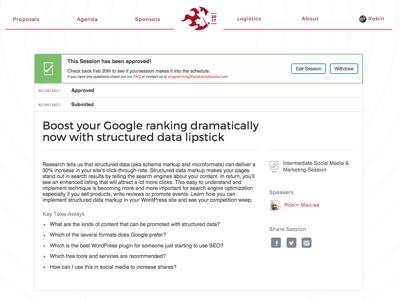
See also Data Markup Strategy for SEO notes, 2016-11-23 | WordPress Toronto Meetup, my earlier post with extensive structured data research notes including articles and posts explaining key concepts and techniques in greater detail.
At PodCamp 2017, I made a second presentation the details and slides of which are in the Digital workplace presentation at PodCamp 2017-02-25 – Workspace Builders post.
If you found my presentation useful, a tweet to that effect would be appreciated (@Robin_Macrae #SEO #structured data #WPTO).
The presentation slides
Boost your Google ranking dramatically now
with structured data lipstick

Overview
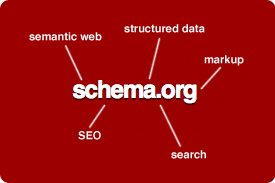
- Schema.org is a structured data markup schema, a semantic tagging vocabulary, supported by major search engines
- increases organic traffic through higher quality presentation in SERPs but ranking benefit is indirect
- many opinions and predictions on its value and future, few authoritative
- lots of techniques, tools and services all of which work on WordPress sites
Why it matters
Google will display additional information about your content in search engine results pages. Your page’s rich snippet makes the content more prominent and thereby increases its CTR and your traffic.
- goal is richer search results to improve user experience
- on-page markup (tags) helps search engines understand the information on web pages and provide richer search results
- provides a standardized search engine “vocabulary”
- can increase a page’s rank depending on who you believe
Ways to structure data
- microdata, microformats, rich snippets
- Facebook has Open Graph
- Twitter has Twitter Cards
- Google+ has authorship
Search with WordPress kinds of structured data for more.
Ways to mark up your data
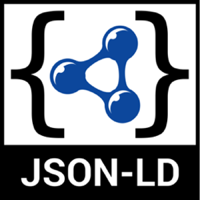 Use the schema.org vocabulary in one of 3 structured data output formats:
Use the schema.org vocabulary in one of 3 structured data output formats:
- microdata (uses HTML tags and attributes to define data)
- JSON-LD (JavaScript based)
- RDFa (HTML based)
Examples: Person/organization (3)
Toronto SEO Guy: No-Nonsense SEO Consulting & Training: org_01a_SEO_consultant_2016-11-21_scn.png:

Examples: Person/organization (3)
Note JSON-LD format, organization type, logo image, social media URLs, Yoast SEO plugin:
<script type='application/ld+json'>{"@context":"http:\/\/schema.org","@type":"WebSite","@id":"#website","url":"http:\/\/torontoseoguy.ca\/","name":"Toronto SEO Guy","potentialAction":{"@type":"SearchAction","target":"http:\/\/torontoseoguy.ca\/?s={search_term_string}","query-input":"required name=search_term_string"}}</script><script type='application/ld+json'>{"@context":"http:\/\/schema.org","@type":"Organization","url":"http:\/\/torontoseoguy.ca\/","sameAs":["https:\/\/www.linkedin.com\/in\/TorontoSEOguy","https:\/\/twitter.com\/TorontoSEOguy"],"@id":"#organization","name":"Toronto SEO Guy","logo":"http:\/\/torontoseoguy.ca\/wp-content\/uploads\/2014\/07\/logo.png"}</script><!-- / Yoast SEO plugin. -->Examples: Local business type
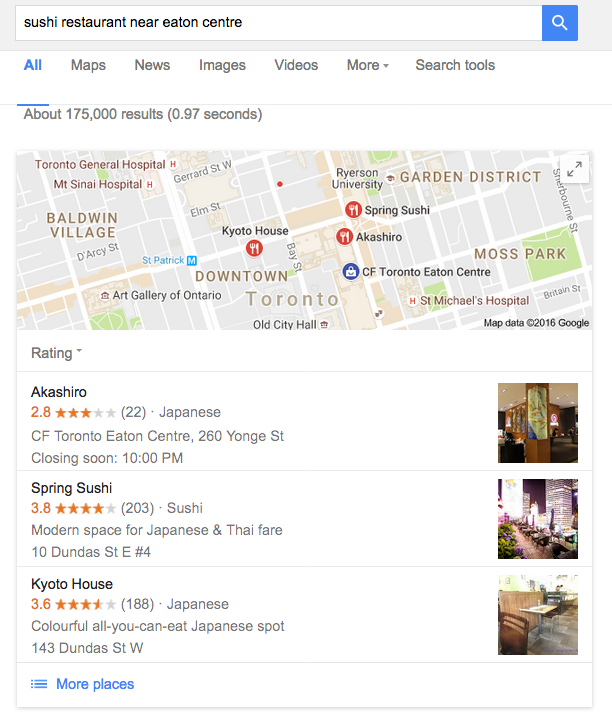
Examples: Other
Official Google Webmaster Central Blog: Rich Cards expands to more verticals: “Users who tap on your Rich Card will be taken near instantly to your AMP page, and be able to swipe between pages within your site.”
See restaurant_card_01a_Google_A.gif. (For some reason, that GIF image causes this page to take an inordinate amount of time to load in FF so I removed it. From the link, the image loads normally in FF.)
Schema.org types (data formats) 1

Here are a few of the many semantic data schema types.
- organization, person
- articles, posts
- products, services
- kinds of content (event, video, movie, recipe, ratings, etc.)
- breadcrumbs (navigation) (schema.org breadcrumbs)
- local business
Schema.org types (data formats) 2
Schema.org‘s list of commonly used types:
- Creative works: CreativeWork, Book, Movie, MusicRecording, Recipe, TVSeries …
- Embedded non-text objects: AudioObject, ImageObject, VideoObject
- Event
- Health and medical types: notes on the health and medical types under MedicalEntity
- Organization
- Person
- Place, LocalBusiness, Restaurant …
- Product, Offer, AggregateOffer
- Review, AggregateRating
- Action
The code (1)
The code that provides the search engines with the data:
- using Articles | Search | Google Developers to view sample markup, JSON-LD and microdata
- Structured Data Testing Tool takes a URL and returns what the SERP would display for the markup in the submitted page
The code (2)
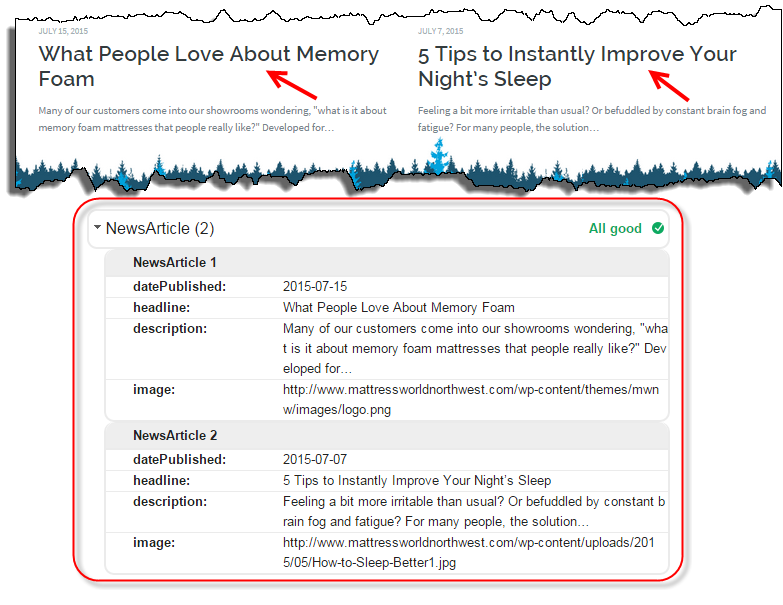
The code (3)
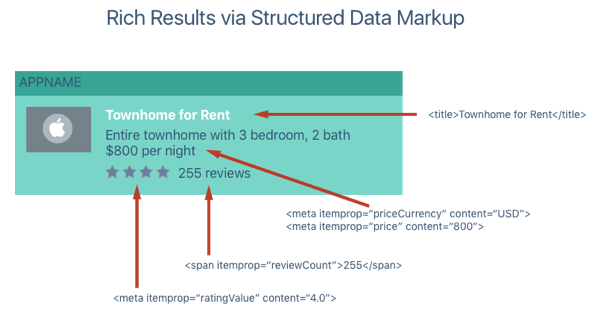
JSON-LD markup code example
From Schema Structured Data – SEO Guide by Raven (General research):
<script type=’application/ld+json’>
{
“@context”: “http://www.schema.org”,
“@type”: “product”,
“brand”: “Raven Tools”,
“name”: “Site Auditor”,
“image”: “https://raventools.com/img/og-raven.png”,
“description”: “Site Auditor analyzes your site to find all of the SEO issues that may be keeping your site from ranking on search engines.”
}
</script>
Google site and tools
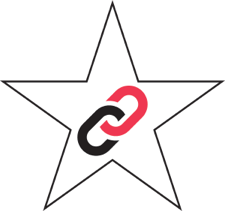
- guidance on using microdata
- wizard to add microdata to a page
- validate structured data on any web page to check that microdata is working
- see what would appear in a SER
Google’s analysis tool
Structured Data Testing Tool: test a snippet, analyze a URL:
- Structured data with Schema.org: the ultimate guide | Yoast > analysis
- Schemaapp.com > analysis
- Samsung 50″ LED TV page > analysis
- Lakeshore Honda > Lakeshore Honda > analysis
Search Gallery | Search | Google Developers is a gallery of business verticals demonstrating how the various structured data types or schemas produce rich results in Google Search.
Yoast SEO plugin’s analysis tool
Snippet preview how-to for Yoast SEO for WordPress | Yoast excerpts:
… A single result in a set of search results is called a snippet. The Yoast SEO plugin has a snippet preview, a simulation of what your post will look like in those results. …
See also the excellent Structured data with Schema.org: the ultimate guide | Yoast.
Plugins (1)

- WP SEO Structured Data Schema | WordPress Plugins (6k) JSON-LD format; the plugin’s developer provides five reasons why he thinks it’s best-in-class
- Yoast SEO | WordPress Plugins (1m ) plugin is noteworthy because it enables semantic tagging not only for Schema.org but also Facebook, Twitter and Google+. Note that its Schema.org markup is both limited and a mix of formats.
Plugins (2)
- WPRichSnippets ($69/yr to $399; Hesham Zebida) is an all-in-one plugin with a variety of options to build rich snippets; for review websites as well as product, organization, or restaurant
- Schema App Structured Data | WordPress Plugins (5k) (see below)
Plugins (3)
My recommendations are:
- Schema App Structured Data | WordPress Plugins (5k) (see next slide)
- All In One Schema.org Rich Snippets | WordPress Plugins (50k). Supports most of the content types: Review, Event, People, Product, Recipe, Software Application, Video and Articles. Works with Google, Bing, Yahoo & Facebook.
Schema App‘s resources are outstanding. They may have the best guidance on a stuctured data strategy.
Services example: Schema App (1)
Schema App service starts at $15/month. 10 domains is $37.

Schema App automates the creation and deployment of JSON-LD on any platform including WordPress for which it has a plugin, Schema App Structured Data | WordPress Plugins (5k).
By default, the plugin optimizes all your pages, posts, author pages and more using information that already exists on your WordPress website. The setup takes only a few minutes and then the optimization is done for you.
Services example: Schema App (2)
With Schema App, you create and manage all of your structured data in one place. You to pick from any itemtype and enter the data for it with the ability to export it to multiple formats including JSON-LD.
The service notifies you when Google changes recommendations and provides you the ability to update your markup in seconds.
By merging schema markup with Google Analytics, the service enables you to discover what markup competitors are using in order to adjust your own to outperform them.
Generator example: Hall Analysis
JSON-LD Schema Generator For SEO – Hall Analysis LLC generates the correct JSON-LD for any page on your site.
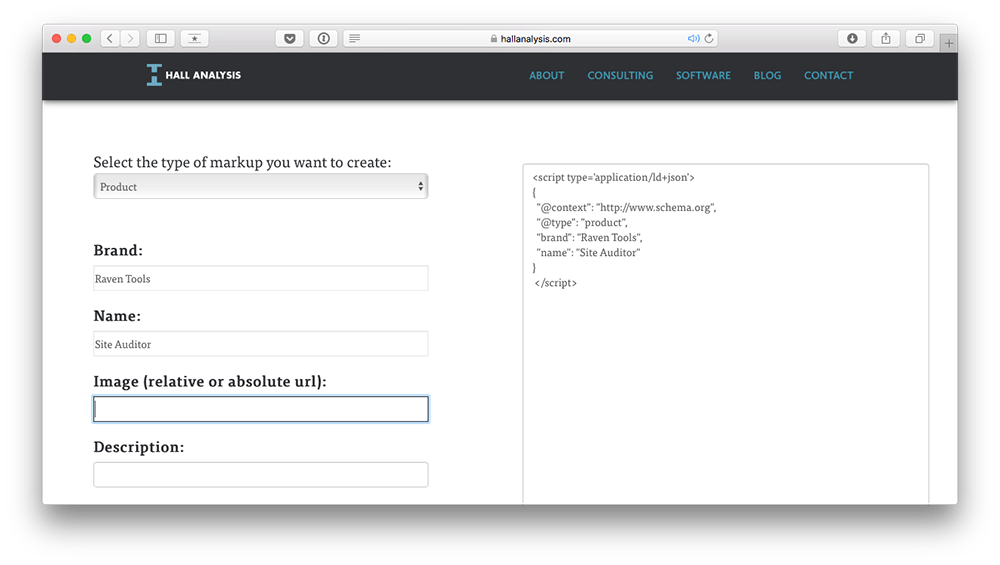
Google’s format preference
- Google prefers microdata for web content (s: Markup Helper)
JSON-LD is the recommended format where possible (s: Introduction to Structured Data | Google Developers) - … a summary of the format of structured data markup Google recommends for specific goals (s: Structured Data Markup Formats: Microdata vs JSON-LD vs RDFa | Engage The Crowd (2016-04-18)
- Google is in the process of adding JSON-LD support for all markup-powered features
- conclusion, JSON-LD
SEO value: the context (1)

- 30% statistic from SearchEngineLand’s 2011 post
- contrary view from Searchmetrics research and analysis 2014
- WP plugin developers and SEO practitioners say it improves SEO including ranking
- while Google says that structured data isn’t a direct ranking factor, it has also said that it may become one in the near future
SEO value: the context (2)
Schema.org & Genesis 2.0 | Yoast Dev Blog (Joost Yoast; 2013) excerpt:
Why implement Schema.org markup?
… Not just Google uses schema.org, all 4 major search engines, Google, Yahoo!, Bing and Yandex use it for several different purposes. … So, in my opinion, schema.org markup is a must for everyone serious about their websites optimization.
SEO value: the context (3)
Webnodes, an enterprise ASP.NET CMS with integrated and dynamic Schema support, states on its home page:
Get more traffic from structured data markup (Semantic tags) proposed by Schema.org – the most important Search Engine Optimization (SEO) tool.
SEO value: conclusions (1)

- higher CTRs generally means higher ranking
- structured data has a very high correlation (i.e., indirect relationship) with search engine rankings
- significant benefits for some schema types (e.g., products in e commerce)
- conclusion, better presentation from structured data plus indirect effects but no direct ranking benefit
SEO value: conclusions (2)
- bonus of faster and more consistent authoring
- logical in that mere structure is not indicative of the content itself but rather a minor measure of its quality like spelling
Key takeaways
- for the effort involved and value in use, this is a no-brainer
- Google the mother ship for tools, resources (no surprise)
- use Yoast SEO if you already have it and supplement as necessary
Extras
- The 20% of SEO That Creates 80% of The Results | Justin BrookeFollow
- What Is Semantic Search and What Should You Do About It? | Moz
While both recommend using structured data in the Microformats and Structure your data to help bots parse content sections, respectively, as a key element of the strategy recommended, I cite them for the strategies themselves.



